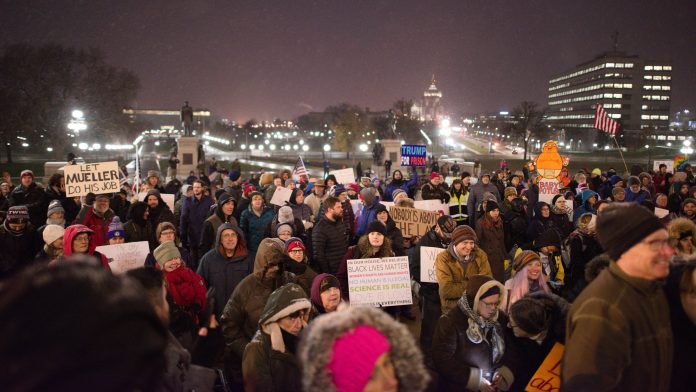A few weeks before the 2016 election, then FBI director James Comey wrote a very strange letter to Congress. He indicated that while he was not going to indict Democratic nominee Hillary Clinton, there was more evidence that he had not yet examined, and that he wanted to “supplement” his previous testimony. This infuriated supporters of Clinton for many reasons, one of which was that it put the former Secretary of State in the position of defending herself against charges that were vague and not formalized by a tangible indictment. In the months following, it became clear that Comey had erred in doing this, not only because he was putting his fingers on the scale in favor of the Republican nominee Donald Trump, but also because he was being sloppy and outside the bounds of what prosecutors and law enforcement officers should do.
And then, two and a half years later, in a much graver context, Robert Mueller gave a press conference where he did pretty much the same thing. Last week, the special counsel charged with investigating Donald Trump’s ties to the Kremlin during the 2016 campaign said essentially that he although couldn’t find Trump innocent, he chose to follow a guideline-not a law but a guideline-that sitting presidents can’t be indicted, but wasn’t entirely sure that he would have indicted Trump if he could have. Despite Mueller’s impressive establishment credentials, this was a vague, irresponsible and disingenuous position.
Mueller found ample evidence of a very troubling relationship between Trump and Moscow, but for some reason we may never know decided not to clarify that with an indictment or more clear language about what he concluded
Shortly after Mueller’s statement, Trump tweeted “Nothing changes from the Mueller Report. There was insufficient evidence and therefore, in our Country, a person is innocent. The case is closed! Thank you.” Despite the hypocrisy of Trump never applying that standard to Hillary Clinton in 2016, the usually unhinged Tweeter in Chief kind of has a point. Mueller could have indicted Trump. There is nothing in the law in the Constitution that forbids it, but he chose not to. Accordingly, Trump rightly, from a strategic perspective, claimed innocence.
The problem with this is that a close reading of Mueller’s brief statement, or a close, or detailed reading, of the report itself, shows that Mueller did not find Trump innocent. Mueller found ample evidence of a very troubling relationship between Trump and Moscow, but for some reason we may never know decided not to clarify that with an indictment or more clear language about what he concluded. Thus, Mueller’s report and his subsequent statements, while important from a historical perspective, do not play the key role in restoring rule of law and democracy that they might have.
The consensus that has emerged from Mueller’s statement his that rather than indict the President, he has given Congress a mandate to pursue impeachment. This allows Mueller to present himself like an institutionalist, suggesting that our Constitutional processes can kick into gear and right the wrongs of the Trump campaign administration. The problem with this ostensibly patriotic notion is that anybody who has been paying attention knows that congress will never remove Trump from office because there will never be 67 votes in the GOP controlled Senate to convict him. Thus, by pushing the responsibility to Congress, all Mueller really accomplishes is to create a political conundrum for Nancy Pelosi, the Speaker of the House and leader of the Democratic Party in Washington. If Mueller was not aware of this, it is not because he eschews politics, but because he is appallingly ignorant. For that reason, it is likely he was aware of the consequence of what he was doing, which raises the question of why he did it.
While it is easy to be frustrated with Robert Mueller, part of the responsibility lies with those critics of Trump who were aware of the depth of his criminal behavior, but somehow believed that the political and legal processes could relatively easily solve the problem
While it is easy to be frustrated with Robert Mueller, part of the responsibility lies with those critics of Trump who were aware of the depth of his criminal behavior, but somehow believed that the political and legal processes could relatively easily solve the problem. For example, Trump’s administration has long been staffed by people like William Barr, whose loyalty Trump far outstrips their integrity, so things like Barr’s dishonest letter following the release of the report, shameful conduct in front of Congress and consistent efforts to misrepresent Mueller’s findings should surprise nobody.
Mueller knew that this was what he was up against, or should have known that. Accordingly, he should have known that anything other than an indictment of Trump or people very close to him, would be dismissed by the Republicans as exonerating the President. But, maybe Mueller didn’t know this. Maybe a lifetime in serving in conservative institutions led Mueller to be more trusting of the processes than he should have been, but the thousands of activists, pundits and other critics of the President who thought Mueller, a product of the conservative establishment whose worldview has always been based around the notion that American political institutions work, was going to save, us should have known better.
www.lincolnmitchell.com
Follow me on Twitter at http://twitter.com/LincolnMitchell

